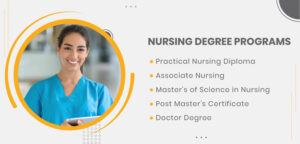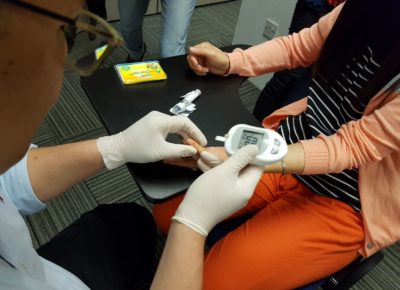Nursing is the only profession that not only helps the doctors but also puts their 100% into recovering the patients. A nursing degree is equally important to be a junior or a senior nurse. Nurses make up the bulk of the healthcare workforce in every medical department. They are essential to assuring the provision of excellent treatment.
Have trouble deciding where to begin your nursing career or what to do next? Please read our guidelines to learn about the career options for each level of nursing degree.
Nursing Degree Programs

-
Practical Nursing Diploma (PN)
The quickest method to begin your nursing career as a licensed practical nurse is to earn your practical nursing diploma. This diploma works closely with RNs and doctors to offer primary nursing care in various healthcare facilities, including hospitals, doctor’s offices, nursing homes, hospices, and urgent care centers.
The practical nursing curriculum equips students with the information and abilities necessary to incorporate safety and quality into nursing care to address the whole person’s requirements, which influence their health, quality of life, and potential.
The fields of healthcare, nursing practice, and the holistic individual are covered in the course material and are built upon. The content promotes involvement in the multidisciplinary team and safe, personalized nursing care using evidence-based practice, quality improvement, and informatics.
2: Associate Nursing (ASN)
Your associate’s degree in nursing will allow you to become a registered nurse (RN) in about two years (ASN). In many healthcare settings, registered nurses (RNs) provide the first line of treatment, and as healthcare organizations try to accommodate an expanding patient population, RNs are in great demand.
3: Bachelor of Science in Nursing (BSN)
Students’ comprehension of the nursing course modules is evaluated in the Bachelor of Science in Nursing program from a theoretical and practical standpoint. Essays, care studies, class discussions, and student presentations are part of assessments that include problem-based learning. The Bachelor of Science in Nursing and Nursing degree gives you a strong foundation in evidence-based practice.
As hospitals and other healthcare institutions react to the Institute of Medicine’s request to expand its bachelors-prepared RN personnel to 80% by 2020, a bachelor’s of nursing science degree is becoming the new educational norm for registered nurses.
An RN with a BSN will generally make more money than an RN without a bachelor’s degree. Future chances for additional education and job advancement are also made available by earning a BSN rather than an ADN/ASN. CSM Academy Singapore is the best institute to get a Bachelor of Science in Nursing degree.
4: Master’s of Science in Nursing (MSN)
Some nursing specializations or managerial positions call for extra education and training. You may develop a nursing degree and broaden your practice area by earning your Master of Science in Nursing (MSN). Three popular MSN specializations are listed below:
-
Nurse Practitioner (NP):
A nurse practitioner is an advanced practice registered nurse with a master’s degree or above. Compared to registered nurses, they have more responsibility and autonomy. NPS offers a high level of treatment that encompasses diagnosing and treating acute, chronic, and episodic diseases, wellness and disease management, disease promotion, and prevention.
-
Nursing Instructor
For the RN profession to be able to address the healthcare demands of both the present and future generations, nurse educators are crucial. Colleges and universities are under more pressure to locate suitable professors to educate and train future nurses as registered nurses return to school and new students apply to ASN or Bachelor of Science and Health in Nursing programs.
A crucial function of nurse educators in the hospital system is to educate nurses. They can communicate vital information to other nurses. They can assist in improving procedures to reduce risks to the patient, nurse, and hospital because of their breadth of knowledge and experience in the industry.
5: Post Master’s Certificate (PMC)
Working nurses can supplement their graduate education with additional specific knowledge and experience by earning master’s level credentials. For instance, a Post-Family Master’s Nurse Practitioner Certificate trains APRNs to become family nurse practitioners who are board certified. MSN holders can become qualified for educator jobs by obtaining a Post-Nursing Master’s Educator Certificate.
6: Doctor Degree:
You can obtain a nursing degree by enrolling in a Ph.D. in nursing school.
The Doctor of Nursing Practice (DNP), Doctor of Philosophy in Nursing (Ph.D.), and Doctor of Nursing Science are three different forms of doctorate degrees in nursing (DNS or DNSc).
Educational institutes provide students with training to transfer research knowledge into practice through our practice-focused Doctor of Nursing Practice program. A minimum number of clinical hours and a research project are requirements for DNP students.
Q/A Session

1: Can I complete my nursing degree online?
Choosing the ideal nursing degree program may seem difficult given your many possibilities. However, it’s essential to maintain your professional objectives at the forefront of your choice. Consider the practice settings your nursing degree can lead you to and the type of influence you wish to have on the nursing profession. Many nursing degree institutes undoubtedly allow online education, even out of counties.
2: Where should I begin when choosing my path?
There are a wide variety of nurses and nursing specialties available. There are specific educational and clinical prerequisites for every specialization. Do your personality test to determine which nursing specialization is best for you.























